Premium
High Five: Eliud Kipchoge rules Berlin again!
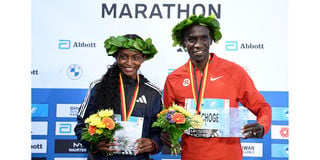
Winner of the women's race Ethiopia's Tigist Assefa (left) and winner of the men's race Kenya's Eliud Kipchoge celebrate on the podium with their trophies after the Berlin Marathon on September 24, 2023 in Berlin, Germany. Assefa smashed the women's marathon world record in Berlin, winning in 2hr 11min 53sec, more than two minutes ahead of the previous mark. Kipchoge's fifth win in Berlin takes him past Ethiopian Haile Gebrselassie's four victories.
What you need to know:
- Kipchoge, who is also the world marathon record holder, dropped Ethiopia's Derseh Kindie at the 32 kilometre mark to run a solo race all the way to the finish line
- His fifth title makes him the most successful athlete in Berlin Marathon, one better than Ethiopian legend Haile Gebrselassie who has four titles to his name
- After dropping Kindie, Kipchoge took control of the race to finish first ahead of compatriot Vincent Kipkemboi who capped a fantastic marathon debut with an impressive time of 2:03:13
Ethiopia’s Tigst Assefa made history with an extraordinary world record, Eliud Kipchoge triumphed for the fifth time as Amanal Petros broke the German record in a pulsating Berlin Marathon that saw Uasin Gishu Governor Jonathan Bii and German Ambassador to Kenya Sebastian Groth join in frenzied celebrations in Eldoret on Sunday.
It was a dream script as NTV’s live broadcast of the 49th edition of the Berlin race attracted a massive street party in Eldoret, the self-proclaimed “City of Champions” in a day of celebration that also saw decorated Kenyan star Faith Kipyegon join fellow elites in the launch of a “Wall of Fame” at Eldoret’s Eka Hotel moments after Kipchoge breasted the tape at the finish line to win in another amazing time of two hours, two minutes and 42 seconds.
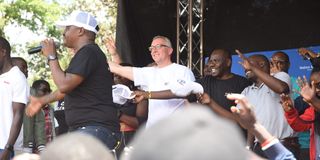
German Ambassador to Kenya Sebastian Groth (centre), Uasin Gishu County Governor Jonathan Bii (second right), and athletic fans during celebration after Eliud Kipchoge won Berlin Marathon, during a Viewing Street Party organised by Nation Media Group's NTV on a giant screen belonging to Uasin Gishu County government on Uganda highway in Eldoret town on September 24, 2023.
Assefa won with a world record straight out of the realms of fairy tale.
The Ethiopian’s pace did not slacken as she ran through the Brandenburg Gate to cross the finish line in a sensational time of 2:11:53, obliterating the world record of Kenya’s Brigid Kosgei who ran 2:14:04 in Chicago in 2019.
The scale of improvement was huge, two minutes, 11 seconds, marking an achievement of historic proportions.
Kenya’s Sheila Chepkirui ran an outstanding 2:17:49 for second place while Magdalena Shauri on her marathon debut caused a major surprise by taking third place in 2:18:41 for Tanzania.
Eight women went under 2:20:00.
The last time the women’s world record featured such an improvement was 40 years ago when the American Joan Benoit brought the time down from 2:25:29 to 2:22:43 in 1988.
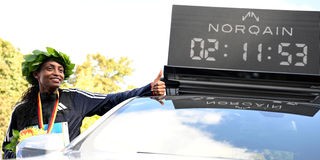
Ethiopia's Tigist Assefa celebrates next to a board displaying her record winning time after she placed first in the women's race of the Berlin Marathon on September 24, 2023 in Berlin, Germany. Assefa smashed the women's marathon world record in Berlin, winning in 2hr 11min 53sec, more than two minutes ahead of the previous mark.
Kipchoge also continued his record breaking, if only in terms of the number of his wins in Berlin.
The double Olympic champion achieved his fifth triumph here with his world-class time of 2:02:42.
Although the 38-year-old finished well outside his world record of 2:01:09, this was nonetheless the eighth fastest performance of all time.
“I came here to make history and I am proud to be the first athlete to win Berlin Marathon five times,” Kipchoge said.
“It is a special place for me and I want to thank all the spectators for the amazing support, I hear it all and it drives me to push myself. I get inspired to see so many people from around the world run together, let's all unite through running.”
In terms of the combined winners’ times, the 49TH BMW Berlin Marathon became the fastest race at the distance in history with a total time of 4:14:35.
It was the second time since 1999 that the race in Berlin now holds both marathon world records.
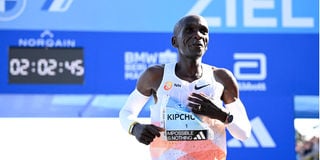
Kenya's Eliud Kipchoge smiles after crossing the finish line to win the men's race of the Berlin Marathon on September 24, 2023 in Berlin, Germany.
Amanal Petros, who spent his pre-race training in Iten, also contributed a slice of German marathon history in breaking his own national record with 2:04:58 for ninth place, the first German to run under 2:05.
His time would have been worth a world record 20 years ago.
It was also a first for the Berlin Marathon, never before had the race produced a national men’s record since its inception in 1974.
Women’s race
The elite women set off at a cracking pace.
By the 10-kilometre mark, the leading group comprised 13 runners, going through in 31:45 and on world record schedule.
Assefa appeared so relaxed that when she reached the drinks station at 15km, she reached for a cup, drank, then handed it to one of her male pacemakers.
A short while later, she tore the leading group apart with a massive increase in pace.
She and her fellow Ethiopian Workenesh Edesa covered the kilometre from 15km in 2:59 and Assefa went through halfway in 66:20, a time good enough to win many international races at this shorter distance.
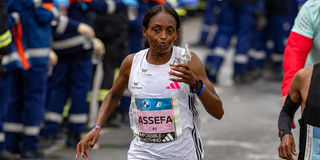
Ethiopia's Tigst Assefa passes a water station at the 22km mark as she takes part in the women's race of the Berlin Marathon on September 24, 2023 in Berlin, Germany.
She proceeded to cover the second half even faster, clocking 65:33.
“In the first half I held something back in reserve for the second half,” explained Tigst Assefa, whose winning time of 2:11:53 would have secured victory at a number of men’s titles in Berlin in the 1980s.
In 1983, Karel Lismont of Belgium won in 2:13:37, the following year Denmark’s John Skovbjerg triumphed in 2:13:35.
“I’ve trained six months for this race. I think this should ensure I am selected for the Olympic Games.”
Men’s race
Kipchoge began at very fast tempo, led by three pacemakers.
The double Olympic champion had already twice broken the world record here, firstly with 2:01:39 in 2018 and last year with 2:01:09.
The signs looked good as he went through halfway in 60:21 and right on world record schedule. It was a surprise to see beside him the unheralded Derseh Kindie, whose best before today was 2:08:23.
The Ethiopian stayed in contention for much of the race but came to a stop around 10km from the finish and dropped out.
At this point Kipchoge’s pace had dipped and he was no longer on world record schedule.
His pace dropped further and behind him the marathon debutant Vincent Kipkemboi was making up the leeway.
Kipchoge put in another effort and moved clear, winning by a clear margin in 2:02:42.
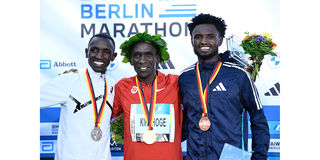
From left: Second-placed Kenya's Vincent Kipkemoi, winner Kenya's Eliud Kipchoge and third-placed Ethiopia's Tadese Takele celebrate on the podium after the men's race of the Berlin Marathon on September 24, 2023 in Berlin, Germany.
Kipkemboi finished a highly creditable second in 2:03:13 and yet another debutant, Tadese Takele of Ethiopia, was third in 2:03:24.
“I missed the world record but I now have the record for the number of wins in Berlin, that’s also something special,” reflected Kipchoge.
Nine men ran under 2:05:00 to give the Berlin race outstanding strength in depth.
Additional reporting by Race News Service






